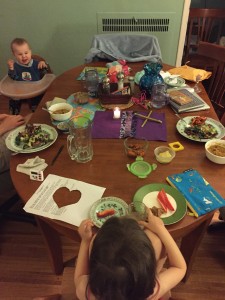From the Associate Rector
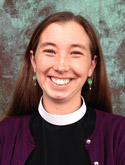 Picking Up Again
Picking Up Again
Much of the time, Lenten disciplines seem to carry an air of all-or-nothing about them. Someone gives up X delectable treat or distracting pastime, tries really hard to fight its seductive power, clenching teeth to bolster resistance for these 40 days. Or, taking the additive approach, folks vow to pray daily, or do service in the community, or make it home for dinner. Whatever the approach, we generally try to start at the beginning of Lent and consistently build on the practice through the season.
And then life happens. At least it does for me. I don’t think I’m alone in this.
Here’s my confession: after working hard with a crew of generous souls to imagine, create and launch the Sacred Hearth project here at All Souls, it took me the better part of a week to actually bring it home to my own family. Since then, we have prayed and reflected with it, a bit. Consistency is hard.
One recent evening, I stepped back just enough to notice the comedy of it all. It’s humbling how elusive it can seem to even attempt to carve out space for the holy in the midst of chaotic living with two small people. That night, overtired children (and parents), wild disappointment in the unfair food options presented, and other sources of deep angst I’ve since forgotten collided to create a scene of much shrieking and widespread domestic shrapnel. Feeling almost amused to do so, I lit our Sacred Hearth candle anyway, a while into our meal. This was the tableau I that observed:
Toys, electronics and their cables, laundry, mail, a timer announcing how much time remained before brushing teeth, preschool valentines, more. And, even still, a tiny bit of space set aside and hallowed.
Through the exhaustion—both theirs and mine—I was surprised to feel this sacred space still anchoring me to something greater. We did not reflect or pray together that night, at least not in the way I’d imagined when designing this practice from beyond the concrete demands of daily life. But the flickering light gave me some pause, a reminder of what is true, the impetus to breathe, a sense of why we keep trying.
And so this Lent, I’m focusing more on that last part, the resolve to keep trying, rather than on the desire to get it consistently right. I’m trying to pay attention to picking back up, to starting again. This feels strangely appropriate to Lent: a very concrete way to practice repenting, that is, turning back. Nadia Bolz Weber puts it this way:
now I see repentance as just returning again to God. Our contemplative in residence, James Wall tells about how difficult a certain Carmelite nun found contemplative prayer to be because her thoughts would wander a thousand times during a 20 minute prayer session. She was sure her teacher Thomas Merton would rebuke her for such a failure, so she was surprised when instead Merton said that her wandering thoughts were just 1,000 opportunities to return to God.
Right. It’s not a failed practice, it’s just the chance to choose the practice again.
So if you missed the start of Lent, (it really shouldn’t coincide with Ski Week, sorry about that…) it’s ok. It’s not too late to press pause and choose a way to practice this season now. We’ll have the various elements to create a Sacred Hearth, along with some fresh additions for those of you already rolling, available this Sunday in the narthex. If you started out strong with a new discipline and have already fallen off, take heart. There’s lots of time to pick it up again, and fall off again, and start back again, all the way to Easter. It’s not so much about getting it right. It’s about practice.
Peace,
Liz+
From the Associate for Liturgy and Music
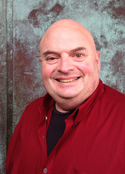 Resting and Returning
Resting and Returning
O God of peace, who hast taught us that in returning and rest we shall be saved: in quietness and confidence shall be our strength: By the might of thy Spirit lift us, we pray thee, to thy presence, where we may be still and know that thou art God; through Jesus Christ our Lord. Amen.
Many years ago, on my second visit to Washington National Cathedral, I found myself in the smallest chapel, the Chapel of the Good Shepherd, where I encountered this lovely prayer written by John Wallace Suter (1890–1977), the fifth Dean of the cathedral. It was only after I had set it to music that I discovered that it had been included in the 1928 Book of Common Prayer and retained in 1979 (p. 672).
I’ve since heard this prayer many, many times, and it has always continued to speak to me. In the same way, the fact that Ash Wednesday was my first liturgy back from my sabbatical resonated particularly strongly.
Both in the first reading, from Joel (2:12), where God calls us to “return to me with all your heart,” and in Liz’s fine sermon about Lent as a spiritual sabbatical, I felt particularly welcomed back by the liturgy itself.
While I had been a bit delayed by a bout of pneumonia for the first couple of weeks I was away, my time in the hospital and at home made for an extra level of rest beyond what I had planned. Even so, I was able to make a start on my original plan of being in residence at Allen Temple Baptist Church, near the Coliseum. My interest began with their outstanding music program, giving me a little new experience to draw on as we build Hearts On Fire Gospel Choir. But more than that particular music itself, being even briefly a part of a congregation with a different life of prayer, worship, and teaching gave me a new perspective on our own community, and I expect to bring some of that experience back in various aspects of our life at All Souls.
I was particularly struck by the way in which every meeting, every class, and every rehearsal begins with everyone taking hands and engaging in prayer, not just for the task at hand, but for any other concerns people might bring. I had been taken aback when, at the end of my first phone conversation with a choir administrator, she asked if we could conclude in prayer. Conclude a phone call with prayer? This was clearly a different kind of community! One of the many special parts of my time at Allen Temple was being a part of their sacramental life, witnessing three baptisms and receiving communion (which is celebrated only on the first Sunday of each month). The baptismal rite, not surprisingly, takes place front and center; above the choir is a baptismal pool. I saw three candidates profess their faith and be immersed three times each, in the name of the Trinity. But the rite was simplicity itself. Being reserved in the Baptist tradition to adults making a commitment in their own name to follow Christ, the depth of the process for receiving new believers is allowed to speak for itself. The liturgical act is much briefer than ours, requiring only the congregation’s prayerful presence, not an outwardly active role in the rite.
I also had the privilege of singing with the choir on the first Sunday of February, which tied two special occasions together. To begin with, the first Sunday of each month is when they celebrate Communion; it is not a weekly celebration, but rather, that monthly practice is nearly universal in the Baptist tradition. Reception of the sacrament is quite different as well, with wafers and small cups of grape juice coming down each pew so the worshipers may all eat and drink at the same time. It’s a very different – and very powerful – understanding of what it means to receive the bread and cup.
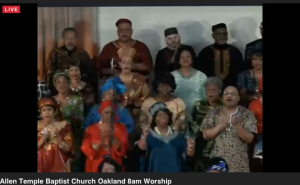
Singing with the Allen Temple Baptist Church Unity Choir (livestream image)
The second of those special occasions was that February 7 was the first Sunday of Black History Month. The attire for the choir – and, indeed, for most of the congregation – was “African” dress. Not having anything appropriate in my closet, I spoke to the choir president, who offered to bring me something. Showing up in a black turtleneck and slacks, I was handed a kufi (the familiar small round cap) and a stole. As a result, I felt completely included in the congregation’s celebration.
But the best part wasn’t just that: afterwards, when I went to return those items to their owner, he gave them back to me, insisting that I should “keep them for next time.” Not only was that generous gesture deeply humbling, but actually reflected my intention for this to be the beginning, not the end, of a much longer relationship. Already there are things I miss from my brief time at Allen Temple, and I look forward to my next chance to visit them, and to welcoming their presence here in the near future.
It was good to be away for a bit, and it’s good to be back. As we pray over our youth when they go on pilgrimage trips, “At their returning, may all they have seen be engraved on their hearts, and their sense of home be enlarged forever.” That prayer, like the one I began with, has been on my mind this past week, and there is no question about it: my sense of church home is indeed larger than it was at the beginning of January. That’s a pretty good starting place!
– CP
In Thanksgiving for the Life of Lewis Patton
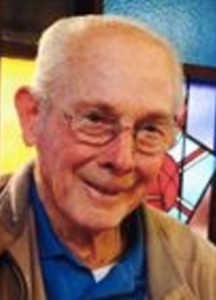 We are saddened to share the news that Lewis Patton died at home on Sunday afternoon, February 14. Information about a service will be shared soon. In lieu of flowers, gifts are directed to All Souls. Please keep Harriet and their family in your prayers. May Lew rest in peace and rise in glory.
We are saddened to share the news that Lewis Patton died at home on Sunday afternoon, February 14. Information about a service will be shared soon. In lieu of flowers, gifts are directed to All Souls. Please keep Harriet and their family in your prayers. May Lew rest in peace and rise in glory.
The beginnings of a money autobiography
Last week, Mary Rees reflected on this year’s vestry retreat, one part of which was beginning to create our own money autobiographies. Over several issues of the Pathfinder, we’ll be sharing the questions we engaged. They are adapted from Elizabeth O’Connor’s prompt in “Scattered Pilgrims.” We invite you to sit with the questions, write about them, talk about them, pray with them.
Reflect on the role of money in your childhood. What is your happiest memory in connection with money? What is your most fraught memory? What attitude did your parents have towards money? What was your attitude toward money as a child? Did you feel poor or rich or average? Did you worry about money?
What was your attitude about money as a teenager? What do you remember from this stage?
How do you feel about your present financial status? What is your present financial situation? What is your income? What are your other assets? What will your income be at age 65, 75, 85? Will you inherit money? Do you think about that?
The Future of Solidarity
How White People Can Support the Movement for Black Lives
Join members of All Souls for Racial Justice at The Future of Solidarity: How White People Can Support the Movement for Black Lives on Tuesday, March 8, 2016 from 7:00 to 9:00 pm at First Congregational Church, 2501 Harrison Street, Oakland. The event features a conversation with leaders of Bay Area Black Lives Matter, including Robbie Clark from Housing Rights Campaign Lead Organizer and Just Cause/Causa Justa, Devonté Jackson, Bay Area Organizer and Black Alliance for Just Immigration, and Janetta Johnson, Executive Director, Transgender, Gender Variant, and Intersex Justice Project. There will be a focus on ways that white people can engage in direct and accountable support to this movement, and build closer connections to the landscape of white anti-racist organizing. This event is open to everyone, an opportunity to come together to listen and learn, deepen our analysis, strengthen our individual and collective capacities and connect with each other. Childcare is available for this event. Please email surjbayarea@gmail.com if you would like childcare. Tickets are $5 – 20, no one turned away for lack of funds. Proceeds go to Bay Area Black Lives Matter. Please email Danielle Gabriel if you are interested in going together.
Announcements
Welcome to our new website!
Did you notice that things look a little different around here? That’s because we’ve just launched this brand new version of our website, after more than a year of hard work by Jocelyn Bergen, our web maven, and the communications team. Some of it is still in process, and much of the improvement is behind the scenes as we’ve moved to a WordPress platform, allowing for more flexibility and creativity. Take a look around and let Liz or Jocelyn know if you find broken links or other areas that need attention. And thanks for your patience as we work out the kinks!
Gather your Sacred Hearth
The Sacred Hearths that many of us have made as a way to practice faith at home through Lent continue to evolve – check out the counter in the narthex for additional supplies and ideas, or to gather the “starter kit” if you haven’t already begun.
Lenten Series
Join us at 6:30 pm on Wednesday evenings during Lent for a soup supper and our Lenten Series. Our program this year is “Entering the Seasons of the Soul” and will use the liturgical year, art, scripture, and practice, led by the Rev. Suzanne Guthrie. If you are able to help provide soup or bread for one of the suppers, please contact Jeannie Koops-Elson or sign up here.
We Do Not Walk Alone: a resource for suicide prevention
On February 28th, All Souls will host We Do Not Walk Alone: A Resource for Suicide Prevention. All youth and those who love them are welcome. Join us in the Parish Hall from 1:00 – 4:00 pm. James Kirkham, Supervisor at Seneca Family of Agencies, and Alicia Hooton, Executive Director of Crisis Services at Seneca Family of Agencies, will lead this suicide assessment and prevention training. Contact Jess Powell for more information.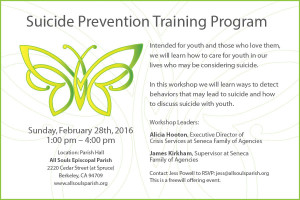
Upcoming Events with the Phoenixes, our 20s and 30s group:
– Saturday February 27, 10:00 – 11:30 am: Brunch and Bible Study in the Parish House (across the parking lot from the church)
– Friday March 4, 7:00 – 8:30 pm: Taizé Service (a time of beautiful meditative music, short prayers, time for silence and reflection, based on the tradition of the Taizé community in France) followed by munchies and conversation in the All Souls chapel (along Cedar St.)
– Saturday March 12, 10:00 – 11:30 am: Brunch and Bible Study in the Parish House.
Email Erica Clites or Emily Hertz to learn more.




